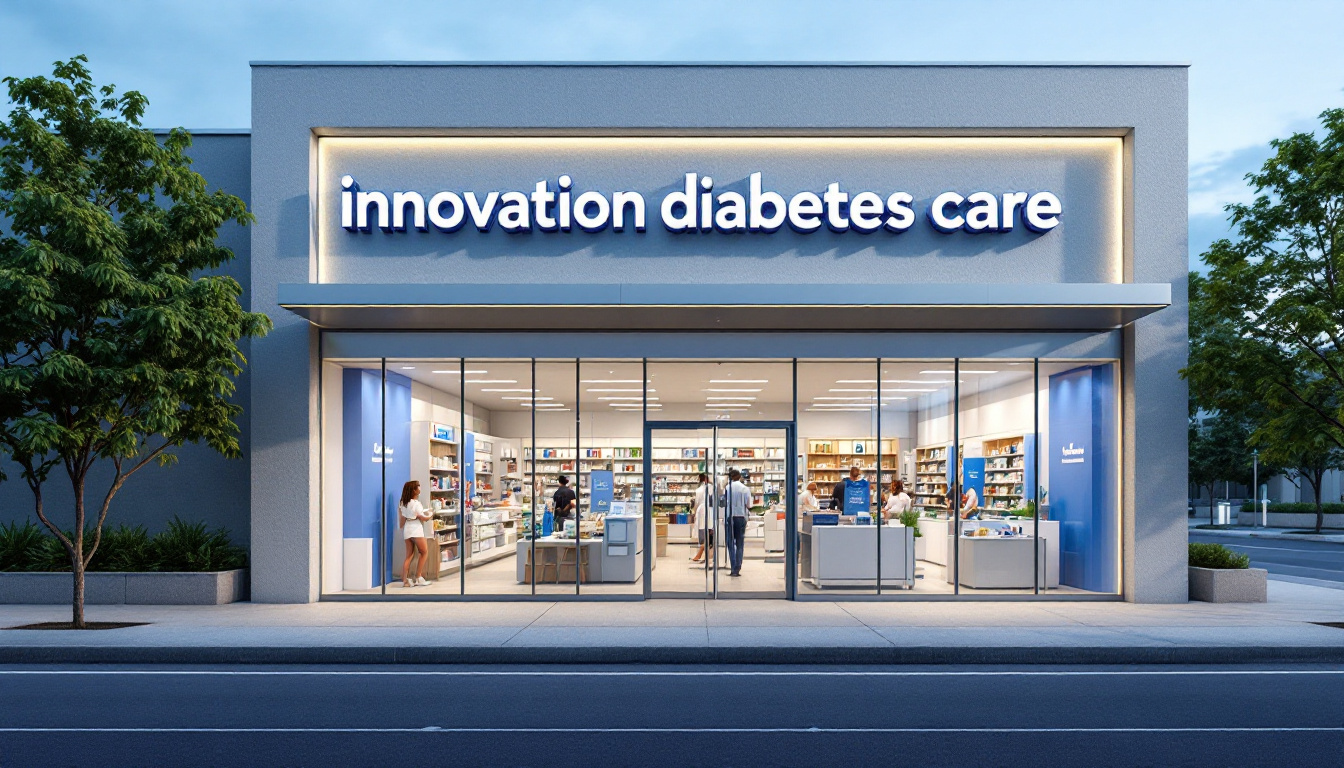How TPN Helps Cancer Patients with Nutritional Deficiencies

Introduction to Malnutrition in Cancer Care
Malnutrition is a prevalent and critical issue affecting a significant proportion of cancer patients, ranging from 40% to 80% of individuals undergoing treatment. This condition is not just a symptom but a compounding factor that adversely affects treatment compliance, quality of life, and survival rates. Addressing nutritional deficiencies is paramount in enhancing patient outcomes, and Total Parenteral Nutrition (TPN) offers a vital means of support when traditional feeding is not an option. This article delves into how TPN functions as an essential component in managing cancer-related nutritional challenges.
Understanding Total Parenteral Nutrition: A Comprehensive Approach
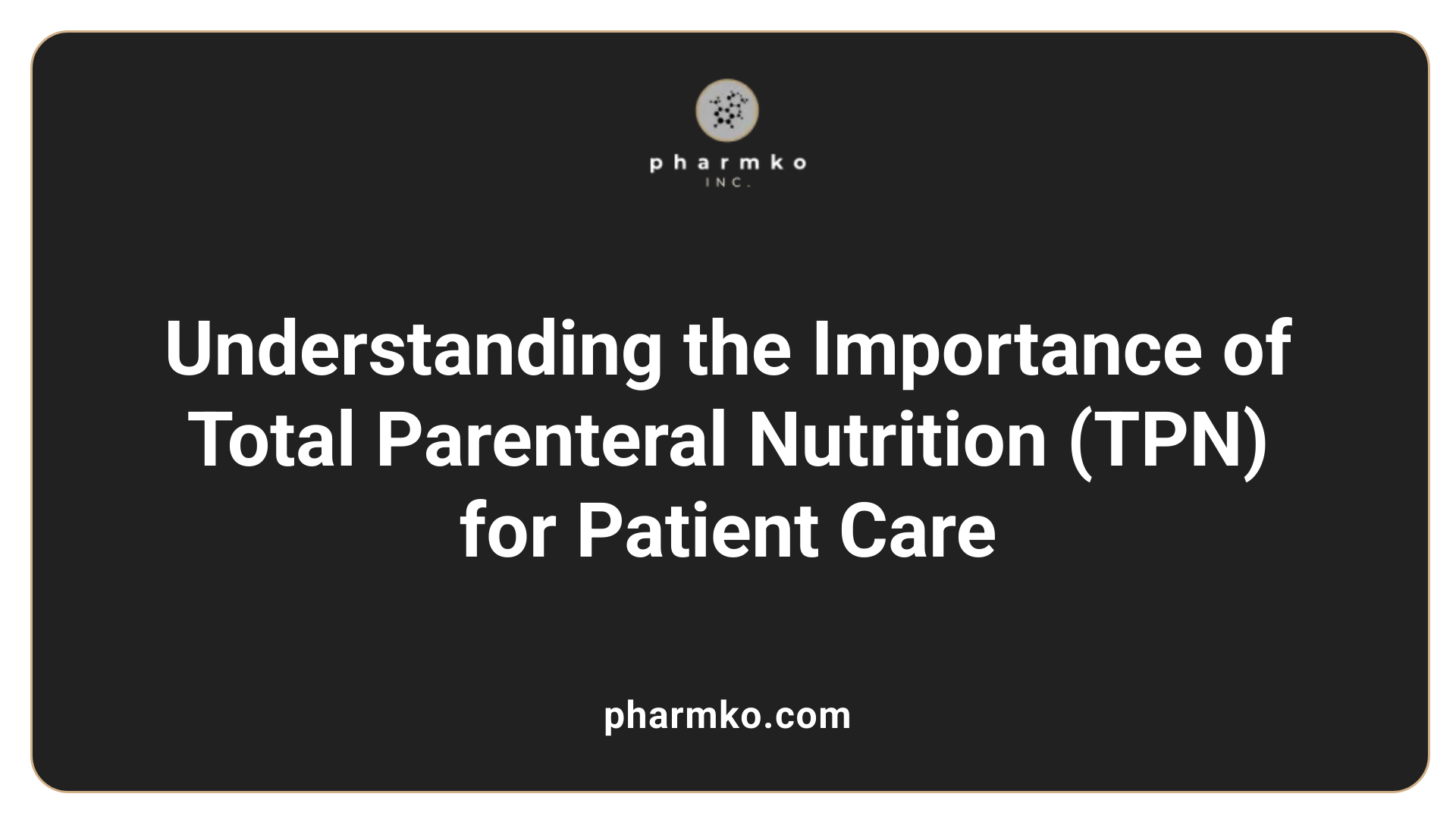
What is Total Parenteral Nutrition (TPN) and why might it be necessary for patients?
Total parenteral nutrition (TPN) is a medical treatment that delivers essential nutrients directly into the bloodstream through an intravenous (IV) line. This method is used when a patient cannot receive nutrition through the gastrointestinal tract due to conditions like chronic intestinal obstruction or severe gastrointestinal impairment.
TPN is designed to provide a complete nutritional profile tailored to the individual, including:
- Carbohydrates
- Proteins (amino acids)
- Fats (lipids)
- Vitamins
- Minerals
Monitoring during TPN therapy is critical to prevent complications such as metabolic abnormalities and infections, especially since it bypasses the normal digestive process. Effective management of TPN can significantly improve patient outcomes, particularly for those facing severe malnutrition.
Why is TPN necessary for certain patients?
TPN is particularly beneficial for cancer patients who experience malnutrition due to treatment side effects, like nausea or gastrointestinal dysfunction. Such patients may be unable to meet their caloric and nutritional requirements through oral intake or enteral nutrition methods.
In cancer care, TPN may aid patients experiencing:
- Severe anorexia
- Cachexia and weight loss
- Malignant bowel obstruction
General role of TPN in managing malnutrition
Overall, TPN plays an essential role in managing malnutrition among cancer patients. It helps to stabilize their nutritional status, allowing them to continue necessary treatment regimens.
Using TPN can lead to:
- Improved treatment compliance
- Enhanced quality of life
- Mitigation of therapy-related complications
In summary, TPN is a crucial intervention for cancer patients battling severe malnutrition, effectively providing essential nutrients to support their health during treatment.
The Role of TPN in Cancer Treatment: Bridging the Nutritional Gap
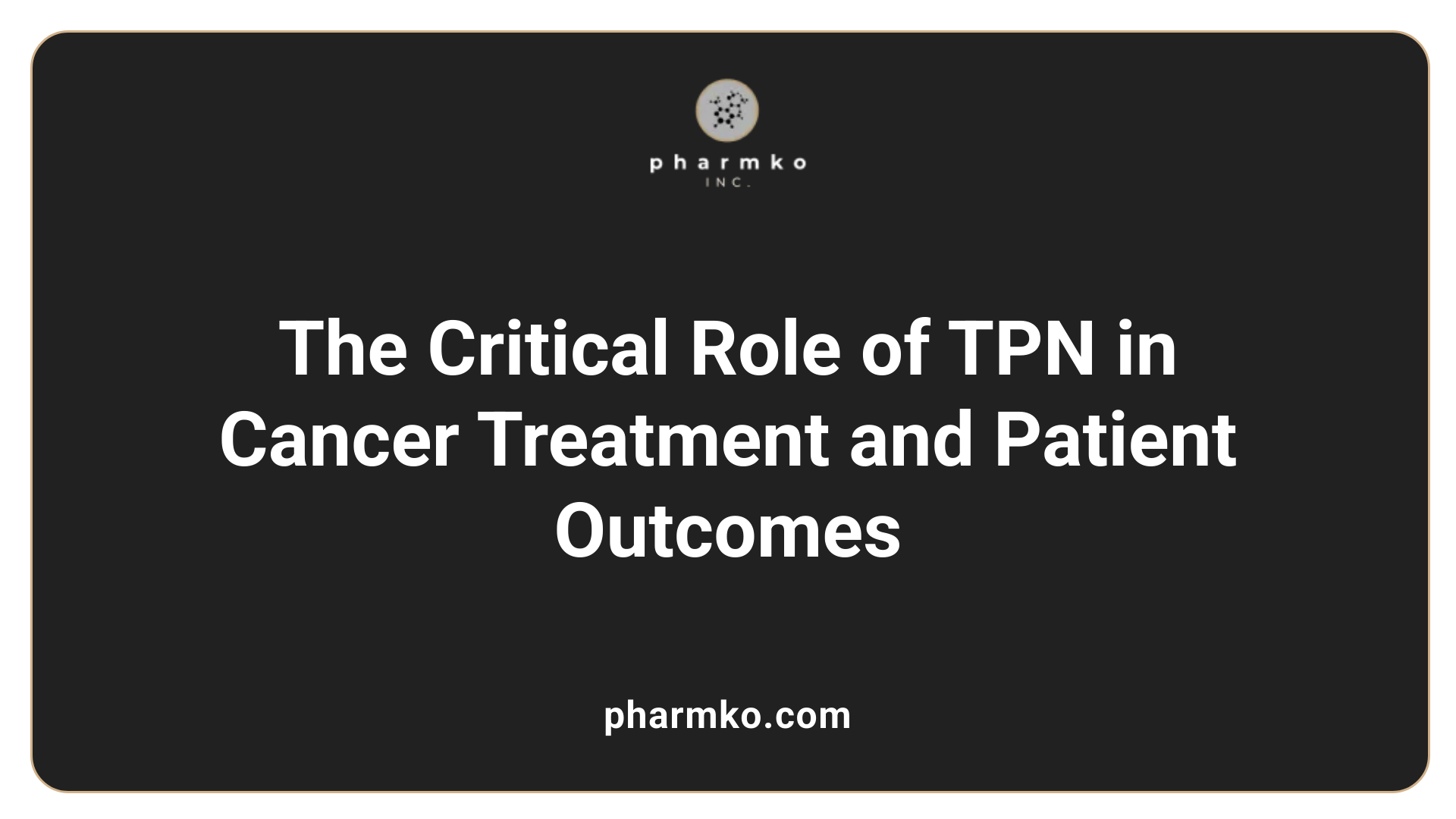
Importance of optimizing nutrition during cancer treatment
Malnutrition is prevalent among cancer patients, affecting 30% to 85% of them. It can result in significant weight loss, reduced treatment efficacy, and decreased quality of life. Consequently, optimizing nutrition is vital for sustaining patients’ health and improving overall outcomes. Nutritional support, particularly through Total Parenteral Nutrition (TPN), can help maintain essential nutrient levels, reverse catabolic states, and manage effects of treatment-induced side effects such as nausea and gastrointestinal dysfunction.
TPN's use in systemic cancer treatments
TPN provides patients with a carefully balanced mixture of carbohydrates, proteins, fats, vitamins, and minerals. This intravenous nutrition is essential for those undergoing systemic treatments like chemotherapy, especially when enteral nutrition is insufficient. By delivering essential nutrients directly into the bloodstream, TPN can enhance patients' ability to tolerate aggressive treatment regimens and improve their metabolic state, thereby supporting better treatment responses and possibly longer survival rates.
Supporting patients who cannot meet nutrition needs through conventional means
Patients with non-functioning gastrointestinal tracts or severe treatment-induced complications often struggle to meet their nutritional needs by traditional methods. TPN is designed for these situations, functioning as a critical lifeline for patients who would otherwise experience detrimental nutritional deficiencies. It is particularly beneficial in palliative care settings where enhancing quality of life is a priority.
Why might TPN be used specifically for cancer patients?
TPN is used for cancer patients undergoing systemic treatment to optimize nutrition because malnutrition can reduce the efficacy of cancer therapies. It is often used as a bridge therapy to support those who cannot meet nutritional needs through conventional means.
| Aspect | Details | Importance |
|---|---|---|
| Malnutrition Rates | 30% to 85% of cancer patients experience malnutrition | High prevalence justifying nutritional interventions |
| Nutritional Composition of TPN | Carbohydrates, proteins, fats, vitamins, and minerals | Essential for maintaining health during treatment |
| Indications for Use | Non-functioning GI tract, severe treatment side effects | Supports recovery and improves survival |
| Timing of TPN Intervention | Initiated when traditional methods fail to provide adequate nutrition | Ensures continuous nutritional support for patients |
| TPN in Palliative Care | Enhances quality of life and relief from severe anorexia and weight loss | Critical for comfort in advanced stages of the disease |
Choices in Nutritional Interventions for Cancer Patients
What are the different nutrition interventions available for cancer patients?
Cancer patients often face malnutrition due to the disease and its treatments, with estimates indicating that 30% to 85% experience some degree of nutritional deficiency. To combat this, there are several nutritional interventions available, including:
- Enteral Nutrition (EN): This involves providing nutrients directly into the gastrointestinal tract through feeding tubes, which is ideal for patients who can still absorb nutrients but cannot eat normally.
- Parenteral Nutrition (PN): This method delivers nutrients directly into the bloodstream, bypassing the gastrointestinal system, necessary for patients who cannot tolerate oral or enteral routes. Within PN, Total Parenteral Nutrition (TPN) provides a complete nutritional solution, rich in carbohydrates, proteins, and fats.
- Supplemental Parenteral Nutrition (SPN): This is used when enteral feeding is inadequate, allowing for improved caloric intake and better management of nutritional status.
How do dietary interventions impact cancer outcomes?
Dietary interventions can significantly reduce cancer growth, progression, and metastasis in multiple solid tumor models, showing promise for improving cancer outcomes in clinical studies. Nutritional support, particularly involving TPN, can enhance patients' responses to cancer treatments while improving their quality of life and treatment compliance. Early nutritional intervention is crucial; it not only helps manage side effects from therapies like chemotherapy but also plays a vital role in prolonging survival in some patients. By addressing the intricate relationship between nutrition and cancer, healthcare providers can tailor strategies aimed at improving remedial outcomes for this vulnerable population.
| Nutritional Intervention | Description and Purpose | Ideal Candidates |
|---|---|---|
| Enteral Nutrition (EN) | Delivers nutrients via feeding tubes into the GI tract. | Patients who can absorb nutrients but cannot eat. |
| Total Parenteral Nutrition (TPN) | Supplies nutrients directly to the bloodstream when GI tract is nonfunctional. | Patients unable to tolerate food intake due to treatment effects. |
| Supplemental Parenteral Nutrition (SPN) | Adjunct to meet nutritional needs when enteral feeding fails. | Patients requiring additional nutritional support on top of EN. |
Impact of Malnutrition on Cancer Prognosis and Quality of Life
How does malnutrition affect cancer prognosis and quality of life?
Malnutrition significantly impacts cancer prognosis and the quality of life of affected individuals. It is closely tied to poorer clinical outcomes, reduced treatment tolerance, and increased complication rates. Statistically, malnutrition affects up to 75% of cancer patients; it is often prevalent at the time of diagnosis and can deteriorate during the course of treatment.
This nutritional deficiency can lead to cachexia, a wasting syndrome characterized by severe weight loss and muscle deterioration. Such conditions negatively influence survival rates, leading to a dismal prognosis for many patients. Moreover, patients suffering from malnutrition may experience increased side effects from therapies, complicating their treatment journey.
Early nutritional intervention is crucial in managing these patients effectively. Research has shown that addressing malnutrition promptly can reduce toxicity from treatments and lead to improved quality of life outcomes.
In addition to clinical nutrition support, standard nutritional screening is a vital component of cancer care. This ensures that healthcare providers can intervene appropriately, leading to better management of nutritional needs, which ultimately enhances both survival rates and life quality for cancer patients.
Importance of addressing malnutrition early in cancer treatment
Timely attention to nutritional status is essential for cancer patients. Implementing interventions such as supplemental parenteral nutrition (SPN) or total parenteral nutrition (TPN) can significantly improve nutritional intake when standard oral nutrition is compromised. By focusing on nutritional support early in the treatment process, healthcare providers can improve patients’ compliance with therapy and preserve strength during challenging treatment regimens, substantially impacting their recovery trajectory and overall health outcomes.
Comparing Parenteral and Enteral Nutrition: Making the Right Choice
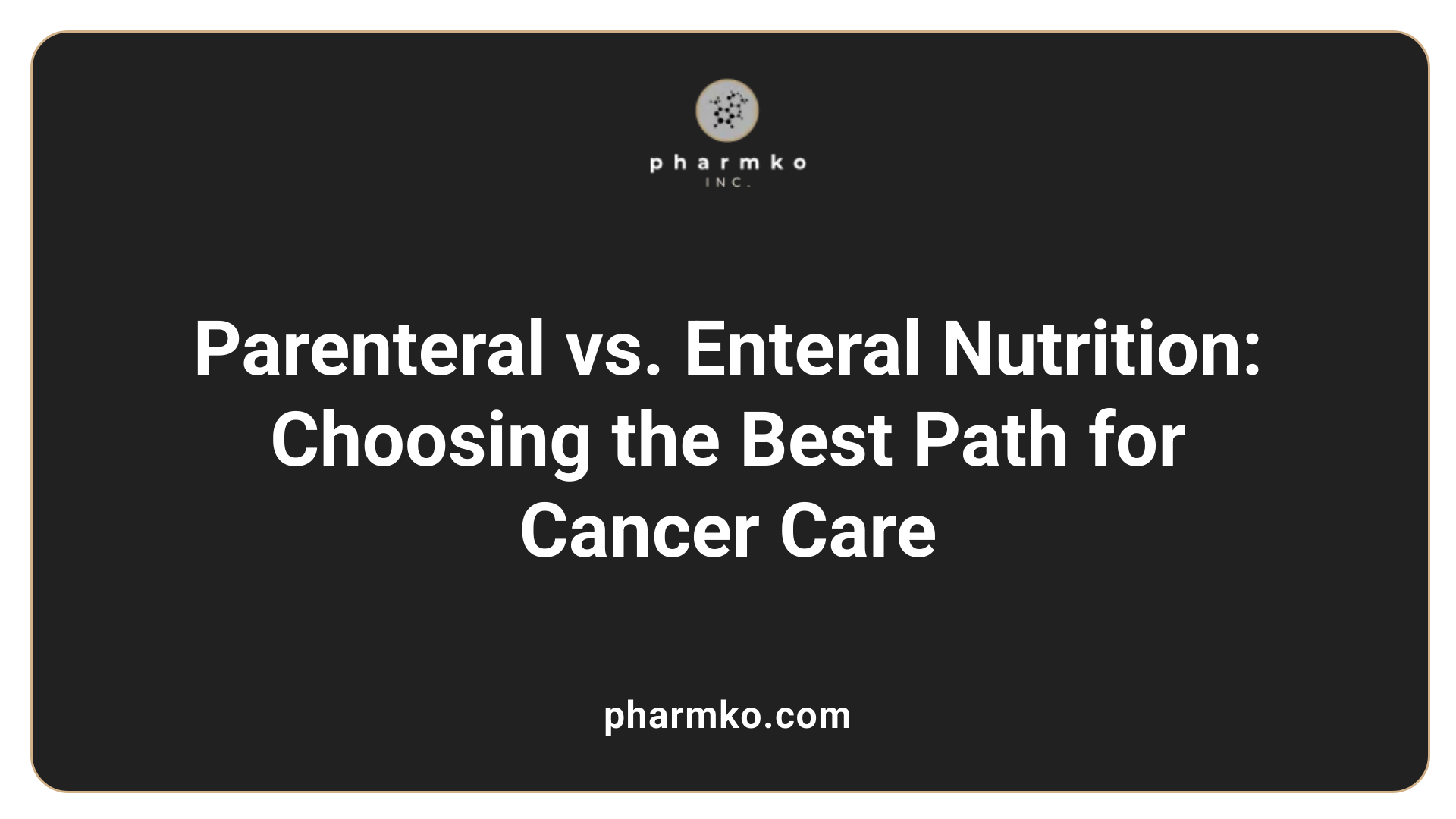
How do parenteral and enteral nutrition methods compare in cancer care?
In cancer care, the use of parenteral nutrition (PN) and enteral nutrition (EN) serves to sustain or enhance patients' nutritional status. Parenteral nutrition involves intravenous delivery of nutrients, making it critical for patients who cannot consume enough food orally.
On the other hand, enteral nutrition delivers nutrients directly through the gastrointestinal tract via feeding tubes, which is often preferred due to its lower risk of complications, including infections and a reduction in overall treatment costs.
What are the risks and benefits of each method?
Here’s a summary of the risks and benefits associated with both methods:
| Method | Benefits | Risks | |--------------|-----------------------------------------------|-------------------------------------------------| | Parenteral Nutrition (PN) | - Provides nutrition when GI tract is nonfunctional |
- Can help maintain nutritional status in severe cases | - Higher risk of infections
- Longer hospital stays
- Potentially increased mortality | | Enteral Nutrition (EN) | - Lower risk of complications |
- Cost-effective
- Utilizes the GI tract for better absorption | - Not suitable if the GI tract is obstructed or damaged |
What decision factors influence the choice of nutritional method?
Several factors should guide the decision on whether to use PN or EN in cancer patients:
- Patient's Nutritional Needs: Evaluate the extent of malnutrition and the patient's ability to consume food.
- Gastrointestinal Functionality: If the GI tract is functional, EN is typically preferred.
- Overall Health Status: Patients' prognosis and desire for invasive interventions must be considered.
- Personal Preferences: Individual values and preferences can significantly impact nutritional choices.
In summary, while both PN and EN have roles in cancer care, EN is generally seen as the safer and more economical option when applicable.
Enhancing TPN's Impact Through Education and Emotional Support
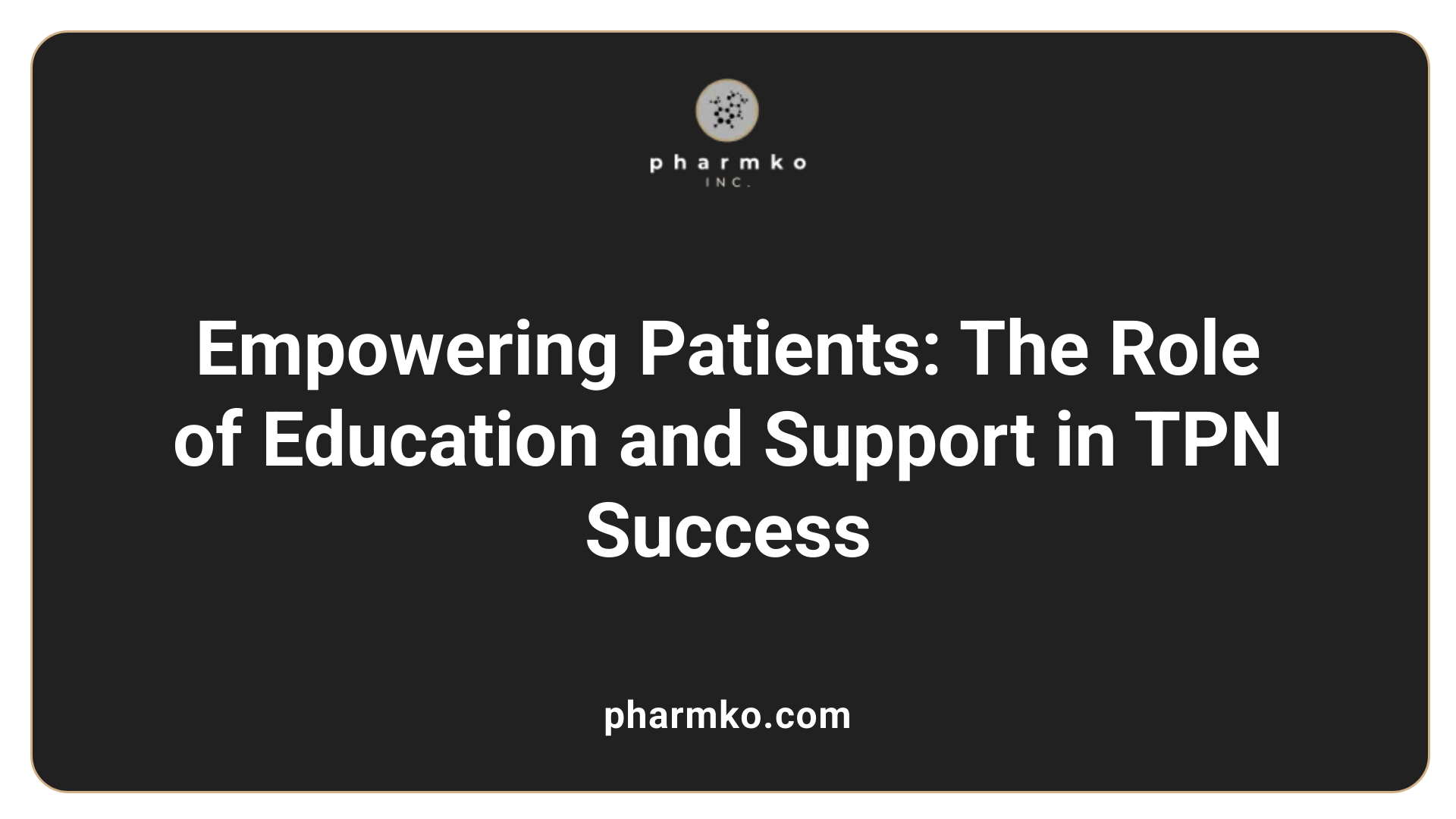
What role does education and emotional support play in TPN administration for cancer patients?
Education and emotional support are essential components in the administration of Total Parenteral Nutrition (TPN) for cancer patients, especially in home care settings. Proper education ensures that patients and their families understand the TPN process thoroughly. This includes recognizing potential complications, managing devices, and adhering to specific nutritional regimens. When patients are well-informed, they are more likely to adhere to their treatment plans, which enhances their overall health outcomes.
Emotional support plays a significant role in patient-centered care. Many cancer patients face psychological challenges, including anxiety and depression, especially when undergoing complex treatments like TPN. These emotional barriers can severely affect adherence to nutritional strategies and overall health-related quality of life. By addressing these issues, healthcare providers can help patients feel more at ease with their treatment regimen.
An interdisciplinary approach is critical in managing the multifaceted needs of cancer patients. This approach not only incorporates educational efforts but also ensures that emotional support is embedded in routine care practices. It fosters a supportive environment that caters to the individual needs of patients, thereby improving safety, emotional well-being, and the effectiveness of TPN therapy.
In sum, integrating educational initiatives and emotional support into TPN administration can significantly improve patient experiences and treatment outcomes. By empowering patients and addressing their psychological needs, healthcare providers can enhance the management of nutrition in cancer care.
Clinical Guidelines and Recommendations for TPN in Oncology
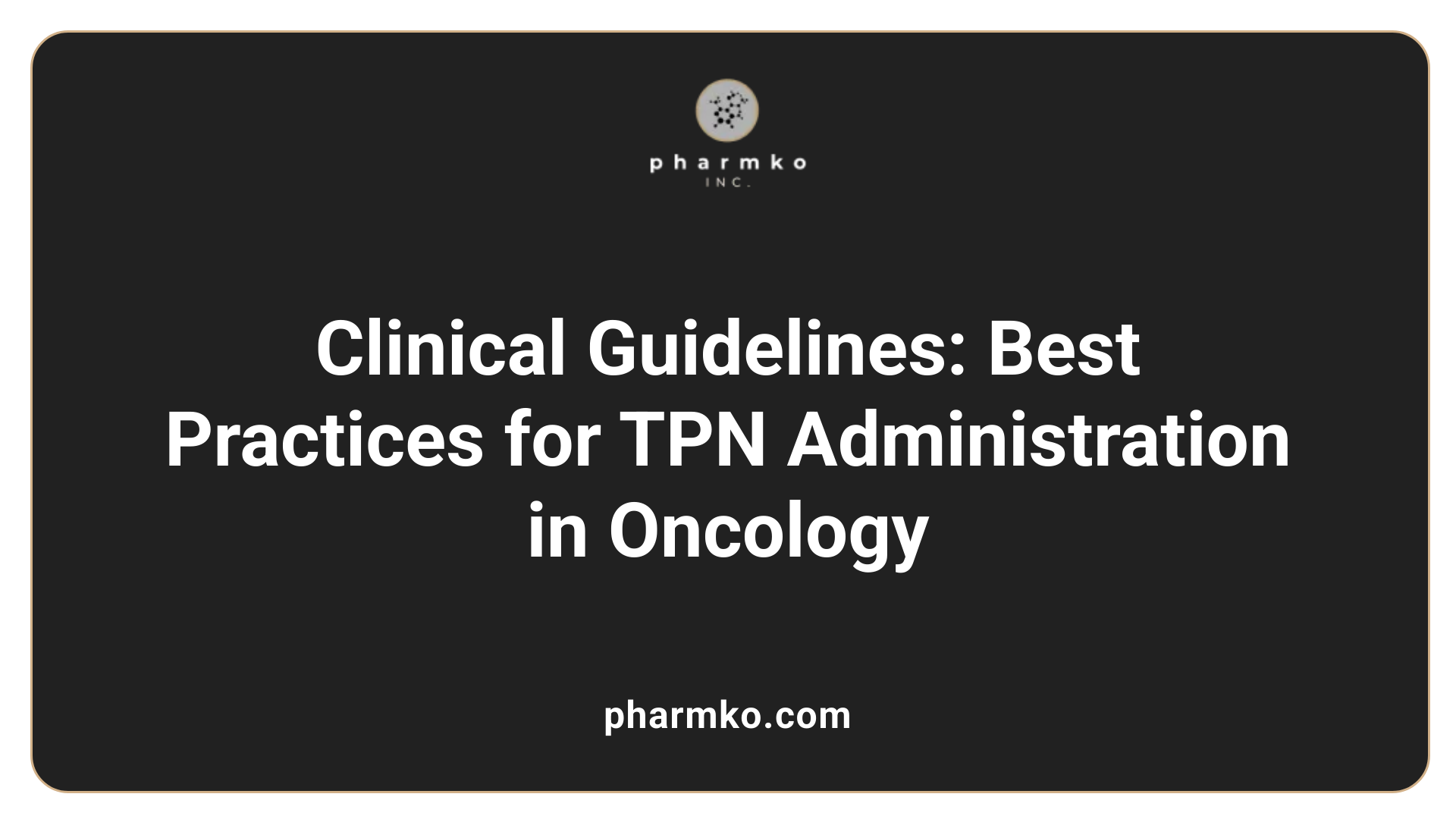
What do clinical guidelines and recommendations say about TPN use in oncology?
Clinical guidelines generally advise against the routine use of total parenteral nutrition (TPN) in patients with advanced, incurable cancer. This caution arises from findings that link TPN to inferior survival rates and a heightened risk of infections. Both the European and American Societies of Parenteral and Enteral Nutrition emphasize that TPN should not be administered during chemotherapy unless there are exceptional circumstances.
For patients with significant weight loss and a life expectancy of 6-12 months, supplemental TPN may be considered to potentially enhance their nutritional status. However, its effectiveness in improving quality of life remains debated, as evidence suggests that TPN does not offer significant benefits to many terminally ill patients.
Risks associated with TPN in advanced cancer
The risks associated with TPN are notable and include potential complications such as infections associated with central venous catheters, metabolic complications, and refeeding syndrome. Moreover, for patients with advanced cancer, the administration of TPN can lead to inferior tumor response rates and poorer outcomes compared to supportive care approaches emphasizing symptom management and emotional support. These risks must be weighed against the potential benefits of nutritional repletion.
Determining when TPN is appropriate
Determining the appropriateness of TPN requires careful patient assessment. Guidelines suggest that TPN may be warranted for patients with non-functional gastrointestinal tracts or for those unable to maintain adequate oral intake. Critical criteria for TPN suitability include irreversible malnutrition, a life expectancy of several months, and the ability to safely administer and monitor the therapy at home.
Ultimately, decisions regarding TPN must be tailored to individual patient circumstances, focusing on the patient’s goals of care, expected quality of life, and the potential for clinical benefit, while involving a multidisciplinary team of palliative care providers to enhance overall patient support.
The Integral Role of TPN in Cancer Care
Total parenteral nutrition (TPN) serves as a crucial lifeline for many cancer patients grappling with profound nutritional deficiencies due to their condition or treatment. While not without its challenges and risks, TPN can significantly enhance quality of life and treatment outcomes when applied judiciously and supported by thorough education and emotional care. As research and guidelines evolve, the judicious use of TPN within cancer care continues to be refined, offering hope and sustenance to those in need.
References
- Supplemental parenteral nutrition in cancer care: why, who, when ...
- Benefits and risks of parenteral nutrition in patients with cancer
- Total parenteral nutrition for patients with gastrointestinal cancers
- PARENTERAL NUTRITION IN PATIENTS WITH ADVANCED ...
- FF #190 Parenteral Nutrition in Advanced Cancer Patients
- The role of parenteral and enteral/oral nutritional support in patients ...
- Home Total Parenteral Nutrition (TPN)
- Enteral and parenteral nutrition for adults - Stanford Health Care
- Nutrition in Cancer Care (PDQ®)–Health Professional Version
- Parenteral Nutrition in Advanced Cancer - SpringerLink




















































